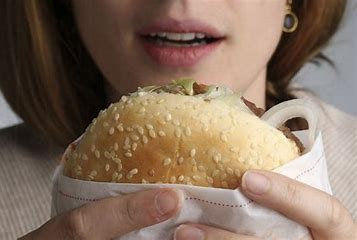Today, the world is faster, and we always seem on-the-go dashing from task to task. Finding time to eat adequately in between can often be a hard task.
Despite being a nation of fitness fanatics with gyms often packed, we are still a nation of takeaways. After all, ‘Fish and Chips’ is still our favourite national dish.
Besides, with the current lockdown enforced through the coronavirus crisis, most of us are in and out of our pantry more out of boredom than hunger.
Our daily routines are disrupted, and many are trying to comfort eat their way to out of uncomfortable feelings of stress uncertainty.
What impact does junk, sweet and convenience food play on our wellbeing?
The Obvious Impact on Physical Health

The links between our physical health and nutrition are well established.
Junk and sugary foods are well linked to conditions such as type -2 diabetes and overindulging in such treats can seriously impact our life expectancy.
There are reports that obesity alone can reduce life expectancy by as much as ten years.
The connection between fatty foods and coronary disease is also well documented.
The way we relate to our physical appearance and self-esteem levels shows that physical appearance can determine the emotional viewpoint of ourselves.
According to an NHS survey, nearly 80% of persons dieting were doing so to look good, rather than to keep fit.
The point being that by somehow looking good, the individual feels better about himself. As the advertising slogans of popular slimming groups states “Look Good, Feel Good”.
Is it as simple as that?
Science would argue that the bio-chemically or more simply put, emotion-based issues such as mental wellbeing are a bit more complicated then simply ‘I look good; hence I feel good’.
However, it is a handy starting point and reason to try to eat healthier and pay more attention to nutrition.
How Nutrients Help our Brain
Food is fuel. It’s what provides the calories which, in turn, get converted as the energy needed by our body to function.
The type of fuel we take in can make all the difference. It’s a bit like using high-quality petrol for a sports car over a cheaper alternative lower grade petrol.
If we put the inferior fuel in, we will get a lower level of performance.

There is a link between the fuel (food) we consume and the functioning of our brain and mood.
By eating higher quality foods that contain adequate levels of minerals and antioxidants, our mind will feel nourished more positively.
The way food interacts with chemicals in our brains differs significantly in food groups.
For example, carbohydrates have a direct effect on serotonin, serving to increase levels. Protein-rich food such as fish or eggs will increase alertness and mental capacity.
Some specific healthy fats such as Omega-3 and Omega-6, are linked to reducing rates of depression.
Since our bodies cannot produce some of these nutrients, we must include them in our daily diets.
The Importance of Fluids
Hydration can play a crucial role in our mental wellbeing. By ensuring we drink on average between 8 to 10 glasses of water per day, it helps us feel fuller for longer.
Hence reducing the impulse for often unhealthy snacks.
It is a fact that we often feel thirst more than hunger throughout the day. However, we decide to try to alleviate the feeling of thirst by consuming food.

By paying close attention to how much water we drink daily, we are helping the brain function—supporting emotional balance and performance in the process.
We are a nation of coffee and tea drinkers. Moderate levels of caffeine are not particularly bad for us. Our morning coffee routine needn’t be tossed to one side.
However, too much caffeine can leave us dehydrated and dependent on the substance.
It can also prevent sleep which, in turn, can have serious consequences on one’s mental health.
Too much coffee also has physical effects such as raised blood pressure and increased risk of a heart attack.
Maybe next time you reaching for the 4th or 5th coffee or tea of the day, it might be more beneficial to reach for a glass of water instead.
Home Cooking Nourishes the Soul
Learning and expanding one’s ability to cook teaches us many things. It nourishes us in many ways and can give us a sense of creative achievement.

By cooking at home, we learn to develop patience, and through following a recipe, we imbibe discipline and planning.
Home cooking can teach us to be resourceful, best using up what we have in our pantry and fridge.
Most importantly, it allows us to have a relationship with what we eat. We get to familiarise ourselves with ingredients and methodology.
Our brain loves to learn and will reward us as we indulge in a new skill such as cooking. Each original recipe we learn will leave us feeling good. The process of acquiring new knowledge in cooking can have an anti-depressant effect on the individual.
So, cook more and don’t be so keen to indulge in pre-made microwave meal alternatives that often contain several additives and preservatives.
The Addictive Dangers of Eating
Most of us can relate to feeling inadequate and subsequently consuming food like chocolate by the bagful to feel better, or maybe devouring a tub of ice cream to get over a heartbreak.

One of the reasons for this is the relation between sugar, carbohydrate and serotonin levels. Serotonin is the feel-good chemical.
Heightened levels of this chemical give a sense of pleasure; it is the “feel-good chemical”. Some foods or activities boost serotonin levels.
Like drugs which also serve to raise serotonin levels, the individual can get addicted to the pleasurable feeling. Craving such foods constantly and wishing to feel good all the time can lead to food addiction.
Individuals with food addiction struggle every day with a loss of control or inability to stop eating foods that are high in carbohydrates, fat, salt, sugar or artificial sweeteners. The individual will often suffer from painful feelings of shame and guilt.
Food addiction is a complex condition that has similarities to other types of addiction, such as drugs, alcohol, shopping or gambling. However, help is available.
Understanding the causes and signs of food addiction can help us lower your risk and change potentially problematic behaviours.
Our organisation has specialists who can help you understand food addiction and can direct you to a team of counsellors to help guide you through recovery for the condition.
To discuss further, send us an online message or call today on 0800 140 4044



